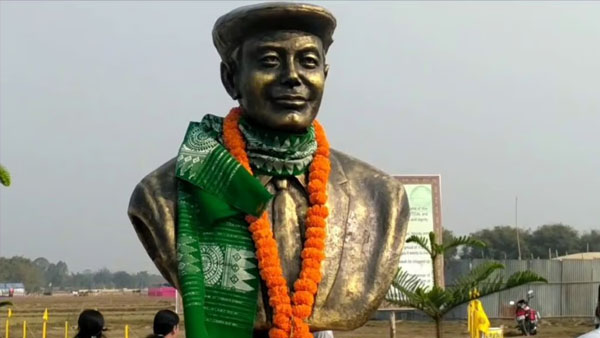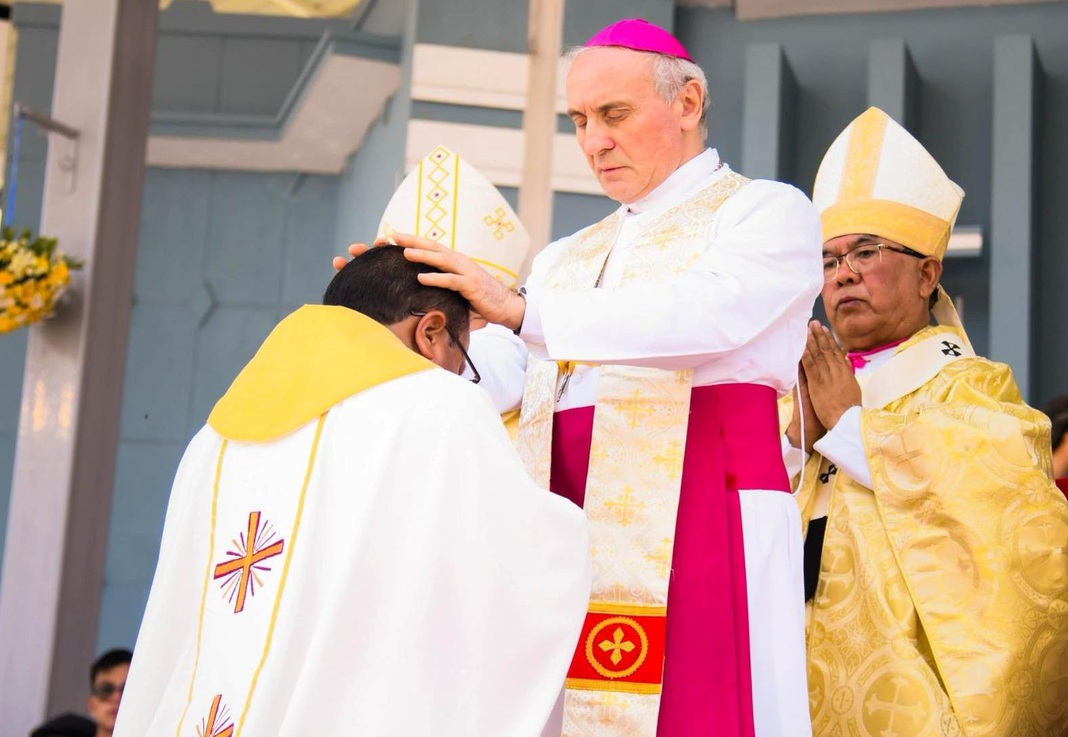By Dipak Kurmi
Upendra Nath Brahma, fondly remembered as “Thopen” in his childhood, was an extraordinary leader who emerged as a beacon of hope for the Bodo community in Assam. His unparalleled dedication to the socio-political and educational upliftment of his people made him an enduring symbol of resilience, leadership, and justice. Revered as “Bodofa,” meaning “Father of the Bodos,” his legacy continues to inspire generations fighting for their rights and identity.
Early Life and Education: The Making of a Visionary
Born on March 31, 1956, in Boragari village near Dotma in Assam’s Kokrajhar district, Upendra Nath Brahma was the youngest of five children in a humble household. His parents, Monglaram Brahma and Lefsri Brahma, instilled in him deep-rooted values of justice and service. His academic excellence was evident from an early age, beginning his formal education in 1963. He attended Dotma High School, Kokrajhar High School, and Sakti Ashram High and Vocational School under the mentorship of Swamiji. In 1975, he passed his matriculation with first-division marks, excelling in Mathematics.
Brahma’s thirst for knowledge led him to Cotton College, where he earned a Bachelor of Science (BSc) with honors in Physics. He later pursued a Master of Science (MSc) at Gauhati University, completing it in 1986. Alongside his scientific pursuits, he obtained a Bachelor of Arts (BA) from Kokrajhar Government College in 1985. His interest in legal studies led him to enroll in an LLB program in 1984, but instances of bullying interrupted his studies. Despite these setbacks, his commitment to education remained steadfast. He worked as a graduate science teacher at Nehru Vocational High School in Gossainichina, balancing his professional responsibilities with his activism.
Political Awakening and the Bodoland Movement
Upendra Nath Brahma’s entry into politics was driven by his unwavering commitment to the Bodo people’s rights. He traveled across Assam, exposing the systemic discrimination they faced, particularly in employment and social recognition. His criticisms of the dominance of Assamese-speaking individuals in government jobs sparked discussions on representation and equity. He strongly advocated for the introduction of Scheduled Tribe (ST) and Scheduled Caste (SC) reserved quotas, which significantly improved Bodo participation in prestigious job sectors.
His leadership within the All Bodo Students Union (ABSU) was pivotal in shaping the Bodoland Movement. Elected as President of the Goalpara District Students Union in 1978-79 and later as Vice President of Central ABSU from 1981 to 1983, he became President of ABSU in 1986. Under his leadership, ABSU transformed into a powerful platform advocating for Bodo rights. His visionary leadership broadened the organization’s agenda beyond student affairs, addressing cultural preservation, linguistic identity, and political autonomy.
Bodofa’s Enduring Legacy and Recognition
March 31, Upendra Nath Brahma’s birth anniversary, is commemorated as “Poraisa San” or Students’ Day, observed annually by ABSU and the BTC government. In 2023, the Assam government officially declared March 31 as Assam Students’ Day (Chatra Divas), ensuring that his contributions to education and social justice are celebrated beyond the Bodo community.
His untimely passing on May 1, 1990, due to blood cancer at Tata Memorial Cancer Hospital in Mumbai, was an irreplaceable loss. His mortal remains were laid to rest at Thulungapuri, Dotma, a site that remains a place of homage. May 1 is solemnly observed as Bodofa Day, where thousands gather to pay tribute to his contributions. In 2025, the 35th anniversary of his passing will be marked with statewide tributes, and the announcement of upgrading his memorial site reaffirms his significance in Assam’s history.
Educational and Social Initiatives in His Name
To honor Bodofa’s vision, numerous institutions bear his name, including U.N. Academy School in Kokrajhar, Upendra Nath Brahma College in Kajalgaon, Bodofa U.N. Brahma College in Dotma, and Bodofa Memorial School in Kokrajhar. These institutions serve as pillars of education, carrying forward his legacy of empowerment.
The BTR government has also launched the Bodofa UN Brahma Super 50 Mission, a free residential coaching program preparing students for competitive exams in engineering, medical, and civil services. This initiative is divided into four specialized schemes:
- Bodofa UN Brahma Super 50 Mission – Engineering
- Bodofa UN Brahma Super 50 Mission – Medical
- Bodofa UN Brahma Super 50 Mission – UPSC
- Bodofa UN Brahma Super 50 Mission – APSC
Additionally, the Upendra Nath Brahma Trust (UNBT) was established in July 1999 in Dotma under ABSU’s initiative. Under this trust, U.N. Academy School was founded, ensuring quality education for Bodo students. Furthermore, the Upendra Nath Brahma Soldier of Humanity Award, instituted in 2004, recognizes individuals who dedicate their efforts to uplifting marginalized communities. The first recipient, Jagen Basumatary, was a noted freedom fighter and social activist. The award, comprising a ₹200,000 cash prize, a memento, and a citation, serves as a testament to Bodofa’s ideals of humanitarian service.
The Historical and Political Context of Bodo Identity
The Bodo people have an illustrious yet largely undocumented history. The Bodo-Kachari kingdom once spanned from North Bengal to Tripura, covering the Brahmaputra and Barak Valleys. Over time, political and socio-economic factors led to their assimilation into Assamese society. Protective measures, such as the Tribal Belts and Blocks, were gradually eroded, exacerbating land alienation and unemployment.
Bodofa’s activism highlighted these systemic issues. He presented a 92-point charter, advocating for a separate Bodoland on the North Bank, a regional council for non-Karbis in Karbi Anglong, and an autonomous region for Bodos on the South Bank. Though he did not live to see it, his efforts led to the formation of the Bodoland Territorial Council (BTC) in 2003, marking a significant milestone in Bodo self-governance.
Challenges and the Path Forward
Despite the strides made, challenges remain. The 2012 ethnic clashes in Assam, rooted in land disputes and demographic shifts, underscored the urgency of sustainable policies. The Bodo people’s struggle is part of a broader issue of identity assertion within India’s diverse socio-political fabric. The failure of developmental projects, flood management policies, and economic stagnation continues to hinder progress.
Bodofa’s vision of peaceful coexistence and sustainable development remains a guiding force. The future lies in:
- Economic Growth: Job creation through industrialization and infrastructure development.
- Educational Empowerment: Strengthening institutions and scholarship programs.
- Political Representation: Ensuring Bodo voices are heard in governance.
- Cultural Preservation: Documenting and promoting Bodo heritage.
The Eternal Beacon of Hope
Upendra Nath Brahma’s life was a testament to selfless service, courage, and unyielding determination. He was not just a leader of the Bodo people but a visionary advocating for inclusivity and justice. His dream of an empowered Bodo community, thriving alongside its Assamese and Northeastern neighbors, remains alive.
As his birth and death anniversaries continue to be observed with reverence, his indelible mark on history serves as a guiding light for future generations striving for justice, equality, and progress. His words and actions remind us that true leadership is about uplifting communities without diminishing others. The journey towards that future, as envisioned by Bodofa, begins today.
(the writer can be reached at dipakkurmiglpltd@gmail.com)




